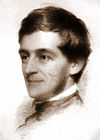
Ralph Waldo Emerson, who went by his middle name Waldo, was an American essayist, lecturer, philosopher, abolitionist, and poet who led the Transcendentalist movement of the mid-19th century. He was seen as a champion of individualism and critical thinking, as well as a prescient critic of the countervailing pressures of society and conformity. Friedrich Nietzsche thought he was "the most gifted of the Americans," and Walt Whitman called Emerson his "master".
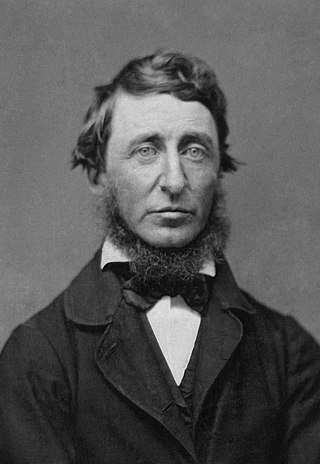
Henry David Thoreau was an American naturalist, essayist, poet, and philosopher. A leading transcendentalist, he is best known for his book Walden, a reflection upon simple living in natural surroundings, and his essay "Civil Disobedience", an argument in favor of citizen disobedience against an unjust state.

Concord is a town in Middlesex County, Massachusetts, United States. In the 2020 census, the town population was 18,491. The United States Census Bureau considers Concord part of Greater Boston. The town center is near where the Sudbury and Assabet rivers join to form the Concord River.

"A Plea for Captain John Brown" is an essay by Henry David Thoreau, based on a speech he first delivered to an audience at Concord, Massachusetts, on October 30, 1859, two weeks after John Brown's raid on Harpers Ferry, and repeated several times before Brown's execution on December 2, 1859. It was later published as a part of Echoes of Harper's Ferry in 1860.

Walden is an 1854 book by American transcendentalist writer Henry David Thoreau. The text is a reflection upon the author's simple living in natural surroundings. The work is part personal declaration of independence, social experiment, voyage of spiritual discovery, satire, and—to some degree—a manual for self-reliance.

Samuel Hoar was an American lawyer and politician. A member of a prominent political family in Massachusetts, he was a leading 19th century lawyer of that state. He was associated with the Federalist Party until its decline after the War of 1812. Over his career, Hoar developed a reputation as a prominent Massachusetts anti-slavery politician and spokesperson. He became a leading member of the Massachusetts Whig Party, a leading and founding member of the Massachusetts Free Soil Party, and a founding member and chair of the committee that organized the founding convention for the Massachusetts Republican Party in 1854.
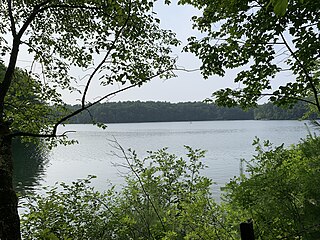
Walden Pond is a historic pond in Concord, Massachusetts, in the United States. A good example of a kettle hole, it was formed by retreating glaciers 10,000–12,000 years ago. The pond is protected as part of Walden Pond State Reservation, a 335-acre (136 ha) state park and recreation site managed by the Massachusetts Department of Conservation and Recreation. The reservation was designated a National Historic Landmark in 1962 for its association with the writer Henry David Thoreau (1817–1862), whose two years living in a cabin on its shore provided the foundation for his famous 1854 work, Walden; or, Life in the Woods. The National Historic Preservation Act of 1966 ensured federal support for the preservation of the pond.

Sleepy Hollow Cemetery is a rural cemetery located on Bedford Street near the center of Concord, Massachusetts. The cemetery is the burial site of a number of famous Concordians, including some of the United States' greatest authors and thinkers, especially on a hill known as "Author's Ridge."

The Old Manse is a historic manse in Concord, Massachusetts, United States, notable for its literary associations. It is open to the public as a nonprofit museum owned and operated by the Trustees of Reservations. The house is located on Monument Street, with the Concord River just behind it. The property neighbors the North Bridge, a part of Minute Man National Historical Park.
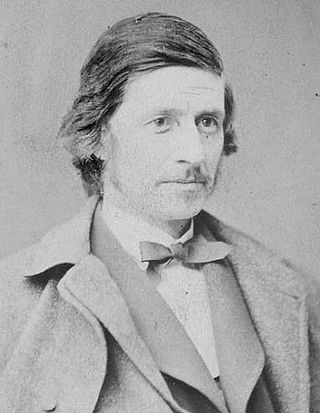
Franklin Benjamin Sanborn was an American journalist, teacher, author, reformer, and abolitionist. Sanborn was a social scientist and memorialist of American transcendentalism who wrote early biographies of many of the movement's key figures. He founded the American Social Science Association in 1865 "to treat wisely the great social problems of the day." He was a member of the so-called Secret Six, or "Committee of Six", which funded or helped obtain funding for John Brown's Raid on Harpers Ferry; in fact, he introduced Brown to the others. A recent scholar describes him as "humorless."

The Ralph Waldo Emerson House is a house museum located at 18 Cambridge Turnpike, Concord, Massachusetts, and a National Historic Landmark for its associations with American philosopher Ralph Waldo Emerson. He and his family named the home Bush. The museum is open mid-April to mid-October; an admission fee is charged.

The Reuben Brown House is a colonial style house located in Concord, Massachusetts.
Amory Hall was located on the corner of Washington Street and West Street in Boston, Massachusetts, in the 19th century. Myriad activities took place in the rental hall, including sermons; lectures by Henry David Thoreau, Ralph Waldo Emerson, William Lloyd Garrison; political meetings; exhibitions by Rembrandt Peale, George Catlin, John Banvard; moving panoramas; magic shows; concerts; and curiosities such as the "Nova Scotia Giant Boy."
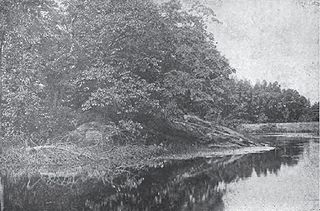
Egg Rock is an outcrop of Silurian Straw Hollow Diorite at the confluence of the Assabet and Sudbury rivers, where they form the Concord River in Concord, Massachusetts. The outcrop is located on a roughly oval intermittent island of about 100 by 50 meters. Egg Rock is usually accessible using foot trails over land, but during high river levels the island is separated from the mainland by a narrow channel. The highest point of Egg Rock is about 39 meters above mean sea level and about 6 meters above normal river level.
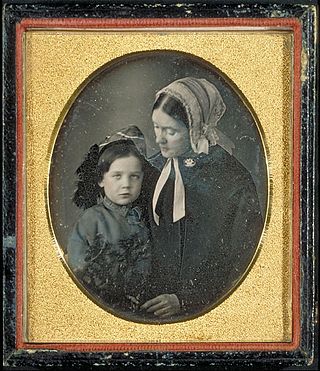
Edward Waldo Emerson was an American physician, writer and lecturer.

Fairyland Pond is a pond within Hapgood Wright Town Forest, a conservation area in Concord, Massachusetts. It is a popular recreation area, notable for its old-growth forest and its association with many literary figures from Concord’s past.

Fairhaven Bay is a lake located within the Sudbury river in Concord, Massachusetts, United States (US). It was frequented by Henry David Thoreau who, together with Edward Hoar, accidentally set fire to the woods near the bay in April 1844, as later described in Thoreau's journal.
Raymond Emerson was an American civil engineer, investment banker, and faculty at the Peabody Museum of Archaeology and Ethnology. He is known for his large donations of personal Ralph Waldo Emerson letters and other documents for educational purposes. He was part of the Emerson family, and was Ralph Waldo Emerson's last surviving grandson. In addition to his marriage to Amelia Forbes, he was also connected to the Forbes family through other marriages in his parents' and his own generations.
A Yankee in Canada, with Anti-Slavery and Reform Papers is an anthology of works by Henry David Thoreau, edited by his sister Sophia Thoreau and his friends William Ellery Channing and Ralph Waldo Emerson. It was published in 1866, after Thoreau’s death, by Ticknor and Fields, the Boston firm that had published Walden.
The Concord Female Anti-Slavery Society was a female abolitionist organisation in Concord, Massachusetts, in the mid 19th century. This society was a significant influence on Henry David Thoreau, Ralph Waldo Emerson, and Louisa May Alcott.


















